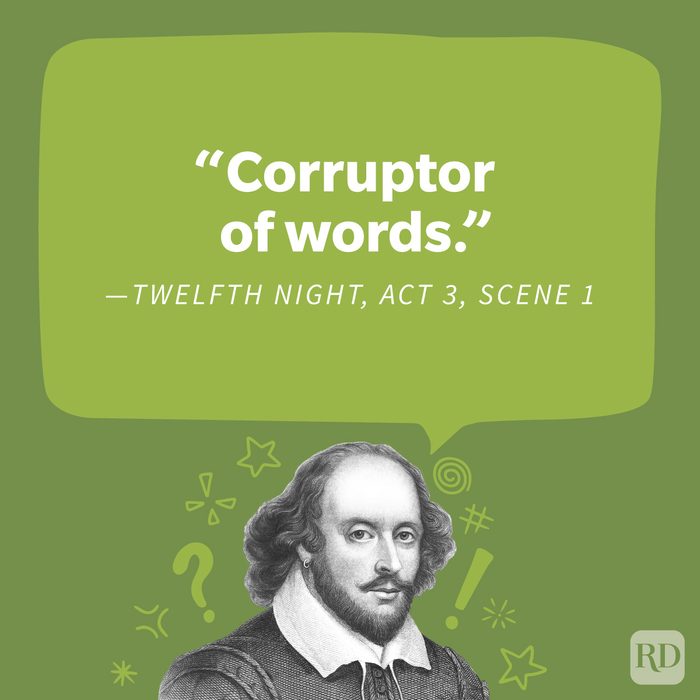When it comes to snide remarks, epic clapbacks and haunting taunts, nothing beats a Shakespearean insult

53 Shakespearean Insults That Still Sting Today


Shakespearean insults for any occasion
1. “Goats and monkeys!” —Othello, Act 4, Scene 1
2. “[You are] duller than a great thaw.” —Much Ado About Nothing, Act 2, Scene 1
3. “The lady bade take away the fool. Therefore, I say again, take her away.” —Twelfth Night, Act 1, Scene 5
4. “Neighbors, you are tedious. ” —Much Ado About Nothing, Act 3, Scene 5
5. “He’s a man of wax.” —Romeo and Juliet, Act 1, Scene 3
6. “Observe him, for the love of mockery.” —Twelfth Night, Act 2, Scene 5
7. “Villain, I have done thy mother.” —Titus Andronicus, Act 4, Scene 2
8. “[You are] pigeon-livered and lack gall.” —Hamlet, Act 2, Scene 2
9. “[C]orruptor of words.” —Twelfth Night, Act 3, Scene 1
10. “You have such a February face, so full of frost, of storm, and cloudiness.” —Much Ado About Nothing, Act 5, Scene 4
11. “What an ass.” —Hamlet, Act 2, Scene 2
Looking for your next great book? Read four of today’s most compelling novels in the time it takes to read one with Fiction Favorites. And be sure to join the community!

Shakespearean insults to hurl in heated arguments
12. “[D]rop into the rotten mouth of death.” —Richard III, Act 4, Scene 4
13. “[You] peevish baggage.” —Pericles, Act 4, Scene 6
14. “[You are] an ass-head, and a coxcomb, and a knave, a thin-faced knave, a gull.” —Twelfth Night, Act 5, Scene 1
15. “I’ll pray a thousand prayers for thy death, No word to save thee.” —Measure for Measure, Act 3, Scene 1
16. “Ungracious wretch, Fit for the mountains and the barbarous caves, Where manners ne’er were preached! Out of my sight!” —Twelfth Night, Act 4, Scene 1
17. “You are not worth another word; else I’d call you knave.” —All’s Well That Ends Well, Act 2, Scene 3
18. “[You] rough rugheaded kern, Which live like venom.” —Richard II, Act 2, Scene 1
19. “A coward, a most devout coward, religious in it.” —Twelfth Night, Act 3, Scene 4
20. “Out of my sight! Thou dost infect mine eyes.” —Richard III, Act 1, Scene 2
21. “My cousin’s a fool, and thou art another.” —Much Ado About Nothing, Act 3, Scene 4
22. “[P]oisonous bunch-backed toad.” —Richard III, Act 1, Scene 3
23. “Bloody, bawdy villain! Remorseless, treacherous, lecherous, kindless villain!” —Hamlet, Act 2, Scene 2

Shakespearean insults for workplace drama
24. “Fie, what a slug is [he].” —Richard III, Act 3, Scene 1
25. “Are his wits safe? Is he not light of brain?” —Othello, Act 4, Scene 1
26. “And thou unfit for any place but hell.” —Richard III, Act 1, Scene 2
27. “A knot you are of damned bloodsuckers.” —Richard III, Act 3, Scene 3
28.”Hath the fellow any wit that told you this?” —Much Ado About Nothing, Act 1, Scene 2
29. “If thy offenses were upon record, Would it not shame thee in so fair a troop to read a lecture of them?” —Richard II, Act 4, Scene 1
30. “You rise to play, and go to bed to work.” —Othello, Act 2, Scene 1
31. “Come, you are a tedious fool. To the purpose.” —Measure for Measure, Act 2, Scene 1
32. “Only to despite them will I endeavor anything.” —Much Ado About Nothing, Act 2, Scene 2
33. “[B]oys, with women’s voices, strive to speak big.” —Richard II, Act 3, Scene 2
34. “Have you no wit, manners, nor honesty, but to gabble like tinkers at this time of night?” —Twelfth Night, Act 2, Scene 3
35. “I am sorry for thy much misgovernment.” —Much Ado About Nothing, Act 4, Scene 1
36. “That’s somewhat madly spoken.” —Measure for Measure, Act 5, Scene 1
37. “[H]e has not so much brain as earwax.” —Troilus and Cressida, Act 5, Scene 1

Shakespearean insults for a bad romance
38. “You kiss by th’ book.” —Romeo and Juliet, Act 1, Scene 5
39. “I have purchased many diseases under her roof.” —Measure for Measure, Act 1, Scene 2
40. “There’s small choice in rotten apples.” —The Taming of the Shrew, Act 1, Scene 1
41. “Beautiful tyrant, fiend angelical! Dove-feather’d raven, wolvish-ravening lamb!” —Romeo and Juliet, Act 3, Scene 2
42. “Marrying a punk, my lord, is pressing to death, whipping, and hanging.” —Measure for Measure, Act 5, Scene 1
43. “[You are] an index and obscure prologue to the history of lust and foul thoughts.” —Othello, Act 2, Scene 1
44. “[You are] a very superficial, ignorant, unweighing fellow.” —Measure for Measure, Act 3, Scene 2
45. “She speaks, yet she says nothing.” —Romeo and Juliet, Act 2, Scene 2
46. “Live you the marble-breasted tyrant still.” —Twelfth Night, Act 5, Scene 1
47. “Being no other but as she is, I do not like her.” —Much Ado About Nothing, Act 1, Scene 1
48. “He’s more, had I more name for badness.” —Measure for Measure, Act 5, Scene 1
49. “Lady, you are the cruel’st she alive.” —Twelfth Night, Act 1, Scene 5
50. “I see, lady, the gentleman is not in your books. No, and he were, I would burn my study.” —Much Ado About Nothing, Act 1, Scene 1
51. “Away, you three-inch fool.” —The Taming of the Shrew, Act 4, Scene 1
52. “I do desire that we may be better strangers.” —As You Like It, Act 3, Scene 2
53. “Heaven truly knows that thou art false as hell.” —Othello, Act 4, Scene 2
Get Reader’s Digest’s Read Up newsletter for more books, humor, travel, tech and fun facts all week long.
Why trust us
At Reader’s Digest, we’ve been sharing our favorite books for over 100 years. We’ve worked with bestselling authors including Susan Orlean, Janet Evanovich and Alex Haley, whose Pulitzer Prize–winning Roots grew out of a project funded by and originally published in the magazine. Through Fiction Favorites (formerly Select Editions and Condensed Books), Reader’s Digest has been publishing anthologies of abridged novels for decades. We’ve worked with some of the biggest names in fiction, including James Patterson, Ruth Ware, Kristin Hannah and more. The Reader’s Digest Book Club, helmed by Books Editor Tracey Neithercott, introduces readers to even more of today’s best fiction by upcoming, bestselling and award-winning authors. For this piece on Shakespeare insults, we verified all facts and data, backed them with credible sourcing and will revisit them over time to ensure they remain accurate and up to date. Read more about our team, our contributors and our editorial policies.
Source:




















